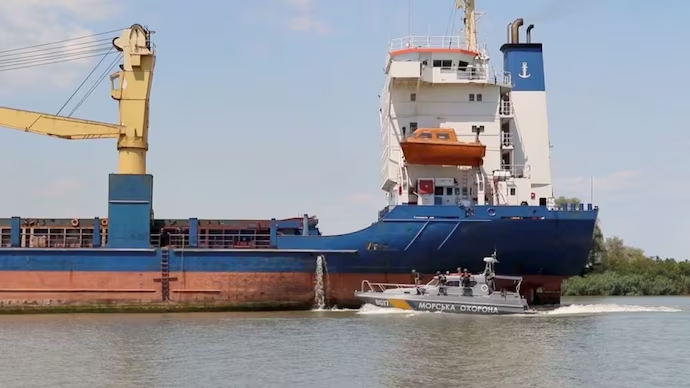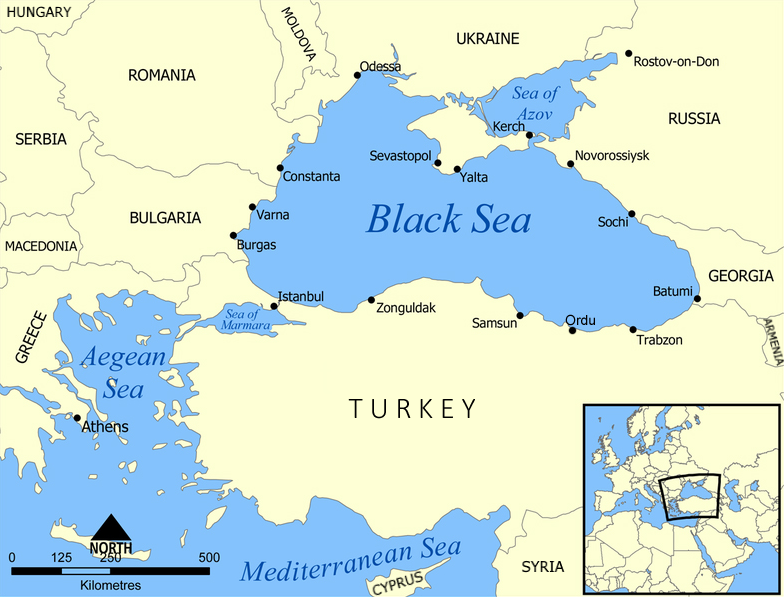
Disclaimer: Copyright infringement not intended.
Context
Overview of the current situation between Russia and Ukraine regarding their Black Sea grain trade and the implications it has on global food supplies.
Details
- Russia warns that ships sailing to Ukraine's Black Sea ports will be considered potential military targets.
- Russia withdrew from the year-old UN and Turkey-brokered safe-passage deal for cargo ships to and from Ukrainian ports.
- The safe-passage deal was aimed at unblocking international shipping in the north-western part of the Black Sea.
- Ukraine establishes a temporary shipping route via Romania to mitigate the impact of the safe-passage deal termination.
Implications for Global Food Supplies and Grain Trade
- Both Ukraine and Russia are major grain exporters.
- US wheat futures spiked 8.5% after Russia's withdrawal from the safe-passage deal.
- Attacks by Russia on Ukraine's ports and infrastructure have disrupted grain shipments.
- Odesa's port infrastructure was targeted using supersonic missiles, affecting food exports to Africa and Asia.
Humanitarian and Economic Consequences
- Around one million tonnes of food were stored in the attacked ports.
- Russia's additional sea mines raise concerns about attacks on civilian ships in the Black Sea.
- Russia's exit from the grain deal poses a threat to global food insecurity and may increase food prices, particularly in poor countries.

Russia's Demands and Western Response
- Russia demands eased rules for its own food and fertilizer exports to return to the grain deal.
- Western countries view this as an attempt to leverage food supplies to weaken financial sanctions on Russia.
- The International Monetary Fund highlights the potential negative impact on global food security.
Ongoing Conflict in Ukraine
- Ukrainian forces continue a counteroffensive in eastern and southern regions to reclaim territory occupied by Russian forces.
- Reports of territorial advancements and a land bridge cutting attempt between Crimea and the eastern region.
- Washington offers additional security assistance to Ukraine worth about $1.3 billion, including air defense capabilities and munitions.
- The European Union considers providing up to 20 billion euros in military aid for Ukraine over four years
About Black Sea
- The Black Sea is a large inland sea located in southeastern Europe and bordered by six countries: Bulgaria, Romania, Ukraine, Russia, Georgia, and Turkey.
- It is connected to the Mediterranean Sea through the Bosporus Strait and the Sea of Marmara to the south.

Disclaimer: Copyright infringement not intended.
Geographical Features
- The Black Sea covers an area of approximately 436,000 square kilometers, making it one of the largest inland seas in the world.
- The maximum depth reaches about 2,212 meters (7,257 feet) in the central part of the sea.
- The coastline stretches for approximately 2,500 kilometers, offering diverse landscapes and significant cultural and economic importance to the surrounding countries.
Importance and Economic Significance of the Black Sea
Trade and Transport Hub
- The Black Sea serves as a crucial transportation corridor, facilitating trade between Europe, Asia, and the Middle East.
- The sea is home to several significant ports, including Odessa (Ukraine), Constanta (Romania), and Novorossiysk (Russia), which handle substantial cargo volumes and support international shipping.
Energy and Resources
- The Black Sea region contains significant oil and natural gas reserves, attracting interest from energy companies for exploration and production activities.
- The sea supports a thriving fishing industry, providing essential resources for the economies and food security of the surrounding countries.
Ecology and Environmental Concerns
Ecological Importance
- The Black Sea is home to various marine species, including fish, marine mammals, and birds, contributing to the region's ecological diversity.
- The coastal areas and wetlands around the sea provide essential habitats for migratory birds and other wildlife.
Environmental Challenges
- The Black Sea faces pollution from industrial and agricultural runoff, affecting water quality and marine ecosystems.
- Introductions of non-native species have disrupted the natural balance of the sea's ecosystems, posing a threat to local biodiversity.
Tourism and Cultural Heritage
Tourism
- The Black Sea coastline is dotted with popular tourist destinations and resorts, attracting visitors with its sandy beaches and warm climate.
- The region boasts a rich history, with ancient ruins and cultural landmarks attracting history enthusiasts.
Cultural Diversity
- The countries bordering the Black Sea have a long history of cultural interaction and exchange, resulting in a diverse and vibrant cultural heritage.
- Each country contributes unique traditions, customs, and culinary delights to the region's cultural tapestry.
|
PRACTICE QUESTION
Q) Discuss the geopolitical significance and environmental challenges associated with the Black Sea region. Suggest measures to promote regional cooperation and sustainable development in the Black Sea area. (250 words)
|

https://www.indiatoday.in/world/story/russia-warns-ships-in-black-sea-ukraine-to-create-temporary-grains-export-route-2409053-2023-07-20





